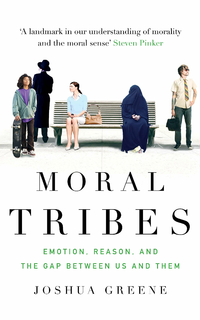Collection
Weekly Reading List 6.6.22
It’s been a busy week, but I managed to finish 3 books. I read my new favorite book about racism, a great book about abolishing debt, and a classic about tribalism and morality. Enjoy!
- Curated in Weekly Reading List 6.6.22
This is one of the best books I’ve read about racism in America, if not the best. This book helped me realize that I’m not going insane with the mass denial of racism in America. Eduardo Bonilla-Silva did in-depth research to survey white people about their thoughts on Black people. While 99.9% of the people interviewed say they have no problem with people of a different race, the interviews show how racism shines through the cracks in what they say. Throughout the book, as I read the transcripts from these interviews, I kept saying, “Holy shit,” because I was baffled at what was coming out of their mouths.
What I’ve noticed is that people tell themselves that racism isn’t a problem while also acknowledging that it exists. For example, ask someone if they think anyone hasn’t got a job or promotion because they’re Black. Then ask them why a specific Black person didn’t get a job, and they’ll start talking about meritocracy and the person probably “just wasn’t the best candidate.” Many of the interviewees were college students, and you can see how difficult it is for people to address their privilege and how they assume Black college students at a good school are only there because of affirmative action. It’s mind-blowing.
When I read a book like this, I do everything I can to challenge it and figure out how it might be wrong or misleading. It’s extremely difficult to do that in this book because aside from the interviews, the author provides data as well. I would say that one area I’m not sold on is that not dating someone of another race is due to a form of racism. While it’s possible, I think it’s completely ridiculous that anyone believes we should be attracted to everyone equally. That’s just not how attraction works. But, there are a lot of disturbing interviews where the people discuss how their families would be furious if they dated a Black person.
This book is 100x better than Robin DiAngelo’s books, and I see people accepting it much better. Rather than sitting there calling white people racist for hundreds of pages, it uses sociology, data, interviews, and other forms of legitimate research. Everyone should read this book, and I’d honestly be curious to see what disagreements people have with it.
- Curated in Weekly Reading List 6.6.22
This was such a fantastic book because it hits you with one of those, “Oh my God. You’re right,” moments as soon as you realize what Taylor is talking about. I honestly haven’t had a moment like that since I first discovered Bernie Sanders and his policy ideas and said, “Yeah. Why is healthcare directly tied to our employment?”. Astra Taylor and her organization argue that we should abolish debt and lays out a multitude of reasons why that is. The current system is set up for debt to accumulate while the rich get richer and wealth inequality gets even worse in our country.
Whenever I hear the word “abolish”, I instantly think the opinions are going to be way too extreme, but Astra Taylor makes an extremely strong argument. She explains how all of these rich corporations have their debt forgiven regularly, but for some reason, we common folk are seen as “irresponsible”. Meanwhile Wall Street is recklessly gambling with the economy, and Taylor even explains how the lack of accountability for these companies has led to contaminated water and health issues for communities.
I still don’t know if I’m on board with eliminating all debt, but I’m a firm believer in fighting for the extreme so we can maybe compromise by getting something reasonable. At the very least, the average American should get the same perks and benefits as these multi-millionaires and multi-billionaires who regularly have their debt forgiven while the rest of us struggle to get by.
- Curated in Weekly Reading List 6.6.22
Moral Tribes was one of the first books I read about moral philosophy and politics, and I wanted to give it another read. Now that I’ve read so many books on the topic, this book was twice as good since I was able to comprehend more of Greene’s ideas, research, and arguments. This book does such a fantastic job explaining why we’re tribal, why we see things as right or wrong, and so much more. Reading this book again also reminded me that this was the book that sold me on utilitarianism in the form of what he calls “deep pragmatism”.
This is a must-read book to better understand ourselves as well as everyone else. I can’t recommend it enough.


